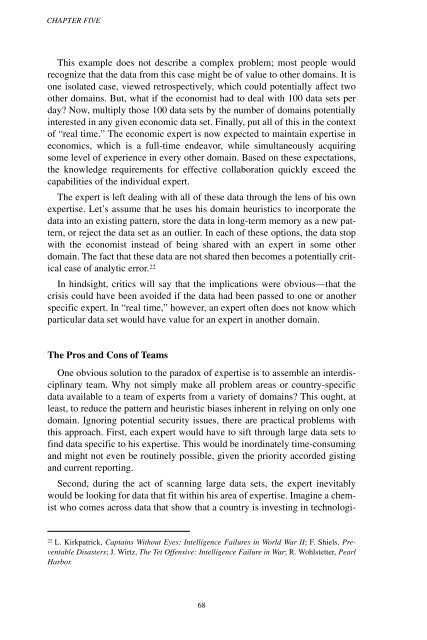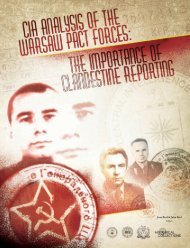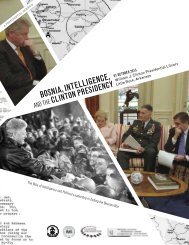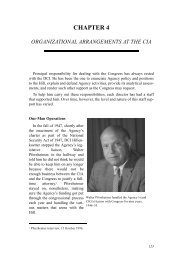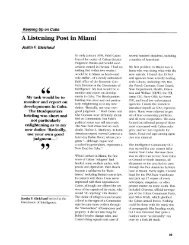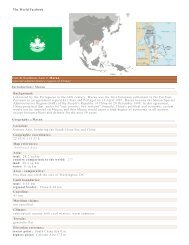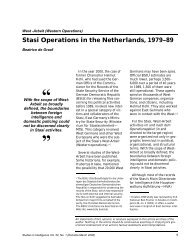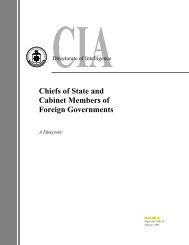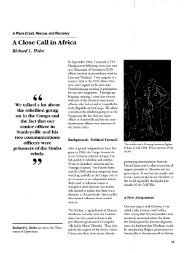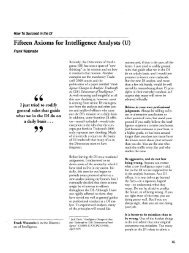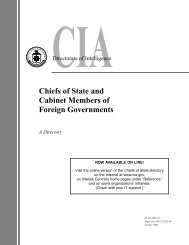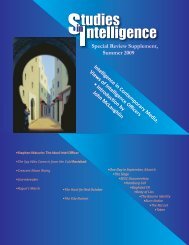Analytic Culture in the U.S. Intelligence Community (PDF) - CIA
Analytic Culture in the U.S. Intelligence Community (PDF) - CIA
Analytic Culture in the U.S. Intelligence Community (PDF) - CIA
Create successful ePaper yourself
Turn your PDF publications into a flip-book with our unique Google optimized e-Paper software.
CHAPTER FIVE<br />
This example does not describe a complex problem; most people would<br />
recognize that <strong>the</strong> data from this case might be of value to o<strong>the</strong>r doma<strong>in</strong>s. It is<br />
one isolated case, viewed retrospectively, which could potentially affect two<br />
o<strong>the</strong>r doma<strong>in</strong>s. But, what if <strong>the</strong> economist had to deal with 100 data sets per<br />
day? Now, multiply those 100 data sets by <strong>the</strong> number of doma<strong>in</strong>s potentially<br />
<strong>in</strong>terested <strong>in</strong> any given economic data set. F<strong>in</strong>ally, put all of this <strong>in</strong> <strong>the</strong> context<br />
of “real time.” The economic expert is now expected to ma<strong>in</strong>ta<strong>in</strong> expertise <strong>in</strong><br />
economics, which is a full-time endeavor, while simultaneously acquir<strong>in</strong>g<br />
some level of experience <strong>in</strong> every o<strong>the</strong>r doma<strong>in</strong>. Based on <strong>the</strong>se expectations,<br />
<strong>the</strong> knowledge requirements for effective collaboration quickly exceed <strong>the</strong><br />
capabilities of <strong>the</strong> <strong>in</strong>dividual expert.<br />
The expert is left deal<strong>in</strong>g with all of <strong>the</strong>se data through <strong>the</strong> lens of his own<br />
expertise. Let’s assume that he uses his doma<strong>in</strong> heuristics to <strong>in</strong>corporate <strong>the</strong><br />
data <strong>in</strong>to an exist<strong>in</strong>g pattern, store <strong>the</strong> data <strong>in</strong> long-term memory as a new pattern,<br />
or reject <strong>the</strong> data set as an outlier. In each of <strong>the</strong>se options, <strong>the</strong> data stop<br />
with <strong>the</strong> economist <strong>in</strong>stead of be<strong>in</strong>g shared with an expert <strong>in</strong> some o<strong>the</strong>r<br />
doma<strong>in</strong>. The fact that <strong>the</strong>se data are not shared <strong>the</strong>n becomes a potentially critical<br />
case of analytic error. 22<br />
In h<strong>in</strong>dsight, critics will say that <strong>the</strong> implications were obvious—that <strong>the</strong><br />
crisis could have been avoided if <strong>the</strong> data had been passed to one or ano<strong>the</strong>r<br />
specific expert. In “real time,” however, an expert often does not know which<br />
particular data set would have value for an expert <strong>in</strong> ano<strong>the</strong>r doma<strong>in</strong>.<br />
The Pros and Cons of Teams<br />
One obvious solution to <strong>the</strong> paradox of expertise is to assemble an <strong>in</strong>terdiscipl<strong>in</strong>ary<br />
team. Why not simply make all problem areas or country-specific<br />
data available to a team of experts from a variety of doma<strong>in</strong>s? This ought, at<br />
least, to reduce <strong>the</strong> pattern and heuristic biases <strong>in</strong>herent <strong>in</strong> rely<strong>in</strong>g on only one<br />
doma<strong>in</strong>. Ignor<strong>in</strong>g potential security issues, <strong>the</strong>re are practical problems with<br />
this approach. First, each expert would have to sift through large data sets to<br />
f<strong>in</strong>d data specific to his expertise. This would be <strong>in</strong>ord<strong>in</strong>ately time-consum<strong>in</strong>g<br />
and might not even be rout<strong>in</strong>ely possible, given <strong>the</strong> priority accorded gist<strong>in</strong>g<br />
and current report<strong>in</strong>g.<br />
Second, dur<strong>in</strong>g <strong>the</strong> act of scann<strong>in</strong>g large data sets, <strong>the</strong> expert <strong>in</strong>evitably<br />
would be look<strong>in</strong>g for data that fit with<strong>in</strong> his area of expertise. Imag<strong>in</strong>e a chemist<br />
who comes across data that show that a country is <strong>in</strong>vest<strong>in</strong>g <strong>in</strong> technologi-<br />
22<br />
L. Kirkpatrick, Capta<strong>in</strong>s Without Eyes: <strong>Intelligence</strong> Failures <strong>in</strong> World War II; F. Shiels, Preventable<br />
Disasters; J. Wirtz, The Tet Offensive: <strong>Intelligence</strong> Failure <strong>in</strong> War; R. Wohlstetter, Pearl<br />
Harbor.<br />
68


